Israel’s Hamas & Hezbollah Conflict Threatens China and Russia’s Middle East Intentions
The horrific bilateral violence may result in widespread regional changes throughout the Middle East and Ukraine. We provide daily updates.
By Chris Devonshire-Ellis
Israel – Palestine – October 13 Update
In Moscow, the Russian Foreign Minister Sergey Lavrov has said that all ten countries of the Commonwealth of Independent States (CIS) trade bloc are urging an immediate ceasefire in Palestine. He said “It is necessary to stop this conflict immediately, to respect international humanitarian law, to prevent any manifestations of terrorist actions, indiscriminate use of force, from which civilians on both sides are already suffering in large numbers.”
In Beijing, Zhai Jun, the Special Envoy of the Chinese Government on the Middle East Issue has spoken with Amal Jadou, First Deputy Minister of Foreign Affairs of Palestine Amal Jadou on the Palestine-Israel situation. Zhai said the immediate priority is to achieve an immediate cease-fire and protect civilians, adding the international community should play an effective role in jointly stabilizing the situation and providing humanitarian assistance to the Palestinian people. China’s Foreign Ministry spokesman Mao Ning told a news briefing that “To end the cycle of conflict between Palestine and Israel, it is essential to restart the peace talks, implement the two-state solution, and settle the Palestine question fully and properly through political means at an early date so as to take care of each party’s legitimate concerns.” China’s Foreign Ministry has said that the fundamental way out of the conflict lies in implementing the two-state solution and establishing an independent State of Palestine.
US opinion is against the Chinese approach and is accusing it of using the conflict to curry favour with the Arab World. The influential American website Politico has said that “China appears to have decided that its road to greater global clout lies through the Palestinians — no matter what hits it takes for going soft on Hamas. China is making a long-term play: to gain favor in the Middle East as well as with countries sympathetic to the Palestinian cause in regions such as Africa and Latin America.”
Arab foreign ministers have urged Israel to meet its international obligations as an occupying power and return to negotiations on a two-state solution that provides a viable state for Palestine. At an emergency meeting of the Arab League in Cairo on Wednesday, ministers underlined “the importance of resuming the peace process and starting serious negotiations between the Palestine Liberation Organization and Israel”. The move is part of a twin track – and largely Saudi-led – initiative designed to de-escalate the crisis, but also make Israel accept that its refusal to negotiate has led to the collapse in relations with Hamas. Washington has expressed disappointment that Saudi Arabia is maintaining that the violence would not have occurred if Palestinians had been granted the independent state they have demanded for decades.
The US Secretary of State, Antony Blinken has arrived in Israel and met with Israeli President Benjamin Netanyahu. He promised unwavering support for Israel in its fight against what he described as a Hamas “reign of terror”. Speaking with Netanyahu, Blinken said Israel will “never, ever be alone.” Blinken said that Israel respects international law and makes efforts to avoid civilian casualties. “We know that Israel will take all of the precautions that it can, just as we would, and again that’s what separates us from Hamas and terrorist groups that engage in the most heinous kind of activities.”
Blinken will meet Palestinian President Mahmoud Abbas and Jordan’s King Abdullah in the Jordanian capital Amman today (Friday 13).
The UN advisor in Gaza, Adnan Abu Hasna, in Gaza has described the conditions as “catastrophic” as the area has been pounded by Israeli warplanes. He said there was no mains electricity and very little water after the enclave’s sole power plant went offline after running out of fuel. Israel has cut all supply of water, electricity, fuel, food, and goods to the territory; home to 2.3 million people. Hasna said that Gazan hospitals had treated 5,000 people injured by the strikes with an estimated 1,500 dead. He said “Whole districts have been bombed and their residents displaced. We’re talking about 500,000 people.”
Israel Katz, Israel’s energy and infrastructure minister, said that no humanitarian aid would be provided for Gaza until all the Israeli captives seized by Hamas were released. “No electrical switch will be turned on, no water hydrant will be opened, and no fuel will enter Gaza until the Israeli hostages are returned.” he wrote. “No one should preach morals to us.”
Ex-CIA Officer Larry Johnson, now a military blogger, has stated that Hamas had, and is using US-supplied weapons to attack Israel. “It’s 100% that the weapons were supplied by the United States,” Johnson said, explaining that the only question was whether Hamas’ weapons had come from US supplies diverted from Ukraine, Afghanistan, or the Palestinian Authority in the West Bank. Noting there were “no effective controls” on the billions of dollars in arms and military financing from the US to Ukraine in the last two years, Johnson said that even weapons supplied by Israel to Ukraine have made it back to Hamas via the black market, being resold by Ukraine. He said the war unfolding in Gaza “will tell us how extensive some of those weapons supplies have been.”
I’ve been asked for data on who invests in the Middle East, we recently produced two such reports.
Our complimentary Middle East Foreign Investment Trends Report can be downloaded here: and its accompanying geopolitical (also complimentary) BRICS & MENA report can be downloaded here.
Finally, our most recent map on the extent of countries who support the existence of an independent Palestine can be seen here. Countries that are against it are marked in red.

October 12 – Updates
In Moscow, Russian President Vladimir Putin has said that Russia has always advocated the implementation of the UN Security Council’s decision on the creation of an independent Palestinian state. “We have always supported the implementation of the decisions of the UN Security Council, first of all, the creation of an independent Palestinian state. This is the root of all problems.” He noted that the Palestinian-Israeli issue has been accompanied and aggravated by “mediation activities” of numerous countries in recent years, almost certainly a reference to the United States and collective West.
In Beijing, China has offered to work with Egypt to end the Israel-Hamas conflict. China’s Special envoy for Middle East affairs, Zhai Jun, has reiterated China’s position for a two-state solution and concern about civilian casualties to Egypt’s Osama Khedr, the assistant minister of the Palestine department in Egypt’s foreign ministry. Beijing has refrained from taking sides in disputes in the Middle East, portraying itself as a friend to both Israel and Palestine.
Like Russia and most Arab countries, China views Hamas as a resistance organization, with a legitimately elected government, and not a terrorist group as designated by the US and European Union. This has caused specific disquiet between Beijing and Washington in particular.
United States military aircraft have landed in Israel to provide ammunition and munitions to the country and support its conflict with Palestine. Israeli ground forces on the border with Gaza have reached over 300,000 in number and now significantly augmented by US military supplies and support. US efforts in Gaza appear to be focused on the 17 American nationals held as hostages somewhere in the area.
The Israeli Prime Minister, Benjamin Netanyahu has stated the Israeli intent to ‘raise Gaza to the ground’. Earlier, Israeli troops bombed the only Gaza exit route out to Egypt rendering it inoperable, with a military ground invasion imminent. Two million Palestinians – nearly all civilians – live in the Gaza Strip.
The Turkish President Recep Tayyip Erdogan has said that what is happening in the Middle East is mass murder, not war. In a strongly worded TV broadcast, he said “The disproportionate use of force against residents of the Gaza Strip, devoid of any moral grounds, being fought with disgraceful tactics, is not war, but mass murder.”
The Turkish leader denounced as wrong any actions against civilians. “We think that there is a moral code in war, and the sides should abide by this. Unfortunately, this concept is being grossly violated in the conflicts in Israel and Gaza.” Erdogan accused the United Nations and other organizations of abandoning the Palestinian people, not delivering on their promises and failing to protect the legitimate rights of the Palestinians. “Attacking the Gaza Strip, bombing civilian settlements, banning entry and bombing vehicles carrying humanitarian cargo is what militant groups do, not sovereign countries.”
The Israeli head of the national defense organisation had earlier warned Egypt that Israel would bomb any humanitarian and supply trucks entering Gaza to provide aid. Israel has cut off all electricity, water, food and supply chains into the area. The United Nations Secretary-General, Antonio Guterres has stated that essential, food, water, humanitrian aid and medical supplies must be allowed into Gaza immediately.
The League of Arab States (LAS) has met at Foreign Minsterial level in Cairo to discuss the Israel-Palestine conflict. At present no statement or details have emerged. In related news, Iran and Sudan have agreed to restore diplomatic relations, which effectively means the entire Red Sea and the Suez Canal are now in the hands of BRICS and BRICS-friendly countries. More on that here.
To add that Iranian President Ebrahim Raisi and Saudi Crown Prince Mohammed bin Salman have held their first-ever telephone conversation to discuss the situation in Israel. Raisi and the Saudi crown prince discussed the ‘need to end war crimes against Palestine,’ Iranian state media has said.
The Saudi crown prince, ‘affirmed that the Kingdom is making all possible efforts in communicating with all international and regional parties to stop the ongoing escalation.’ He also reiterated Saudi Arabia’s rejection of targeting civilians in any way, according to Saudi state news agency SPA.
The two countries re-established diplomatic relations earlier this year in a rapprochement brokered by China.
It’s good they’re talking. It’s not the United States who will solve this – it has to be a regionally agreed solution.
Finally, in response to the map I provided yesterday showing countries that recognise Palestine as a legitimate state, several readers said it looked familiar. That’s because it is. The countries that do not recognise Palestine are almost exactly the same as those who imposed sanctions upon Russia.
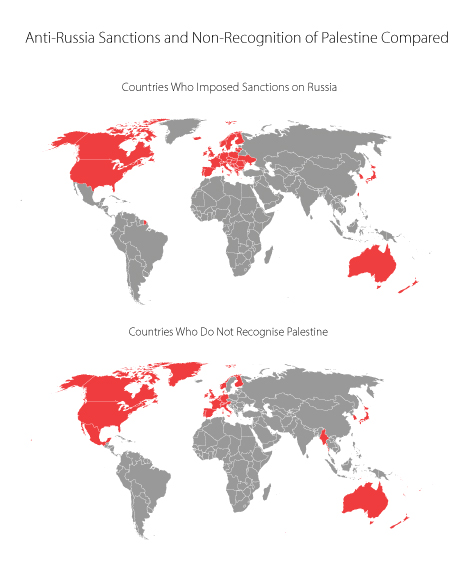
If proof were needed that Western allied nations are trying to impose their geo-political interests on the rest of the world, this map represents a growing body of evidence that this is indeed the case. As Vladimir Putin said last week at Russia’s Valdai Club think tank summit, “The West always talks about a global ‘rules-based order’. But this is based on their making the rules and excluding everyone else.”
October 11 – Update
I’ve been getting posts to my Linked In account (you can touch base with me here) that are so off base about the causes of the Israel-Palestine clash I fear for people’s rationality. These have ranged from Moscow being responsible in order to divert attention away from Ukraine, to the Chinese Uyghurs being behind these attacks. Such is the distorting power of social media. Anyway, back in the real world:
Moscow’s Foreign Ministry has said it is in close contact with the leading regional players, whose role in stabilizing the situation and creating conditions for establishing direct Palestinian-Israeli dialogue Moscow has said is “indispensable.” Russian President Putin has called for all sides to ‘minimise civilian casualties.’
The Western media have targeted Chinese President Xi Jinping as not having the influence he has portrayed over the Middle East and has criticised China for its approach. The US Senate Majority Leader Chuck Schumer is currently in Beijing for talks with the top Chinese officials and told Wang Yi, the Chinese Foreign Minister and Chinese State Councillor that he was “Very disappointed, to be honest, by the Chinese foreign ministry’s statement that showed no sympathy or support for Israel during these tough, troubled times.”
China and Russia are taking a bilateral ‘Israel and Palestine’ approach without taking sides. On Tuesday, Beijing issued a statement that said it ‘opposes and condemns’ actions that harm civilians in the Israel-Hamas conflict.
Washington, which provides about US$3 billion in annual military aid to Israel, has ordered the movement of US navy ships and aircraft to the Israeli (and Palestinian) coastline. President Joe Biden has ordered the deployment of the USS Gerald R Ford Carrier Strike Group, which will be moved to the Eastern Mediterranean alongside its accompanying warships.
The USS Ford is the US Navy’s most advanced aircraft carrier, and one of the largest in the world. The carrier hosts a guided missile cruiser and four guided missile destroyers. The US is additionally sending USS Normandy, a guided missile cruiser armed with naval guns, and destroyers USS Thomas Hudner, USS Ramage, USS Carney and USS Roosevelt. The US is augmenting this with Air Force F-35, the most advanced fighter jet in the world, along with the F-15, F-16, and A-10 fighter aircraft squadrons in the region.
Marwan Bishara, Al Jazeera’s senior political analyst, has questioned why the US would send aircraft carriers – with some 5,000 sailors on it – and the most sophisticated aircraft in the world when Israel is more than capable of dealing with Hamas in the Gaza Strip. Bishara called the US decision to move the Ford Carrier “a major escalation.”
Saudi Arabia has called for support for the Palestinians, along with all other Arabic nations. The League of Arab States (LAS) Foreign Ministers are meeting today (Wednesday 11) in Cairo.
Israel has also been guilty of some outrageous behaviour. Tel Aviv has warned Egypt, which also borders the Gaza Strip, that it would bomb any aid trucks sent to relieve the pressure on Palestinian residents.
The British Home Secretary, Suella Braverman has advised the British Police that it may be considered a criminal offense to wave a Palestinian flag in the UK. She also stated that “I would encourage police to consider whether chants such as: “From the river to the sea, Palestine will be free” should be understood as an expression of a violent desire, and whether its use in certain contexts may amount to a racially aggravated section 5 public order offence.”
The Venezuelan President, Nicolas Maduro has stated that black market weapons appear to have been used by Hamas that had been originally intended for use by Ukraine and had been sold on by Kiev and the Zelensky Government. Venezuela recognises Palestine as a sovereign state. These allegations have not been proven at this stage.
It should be noted that of the 193 members of the United Nations, 138 regard Palestine as a sovereign nation. The United States, Canada, European Union, the United Kingdom, Australia, New Zealand and Israel do not, meaning the political background to non-recognition of Palestine issue is almost identical to the countries that have imposed sanctions upon Russia.
Accordingly, the current situation may be viewed in part as the same struggle – a unipolar, Western focused world attempting to impose its will above the wider global consensus. For this reason, the Palestinian issue has become somewhat existential: its resolution one way or the other determines where the global balance of power lies: East, or West.
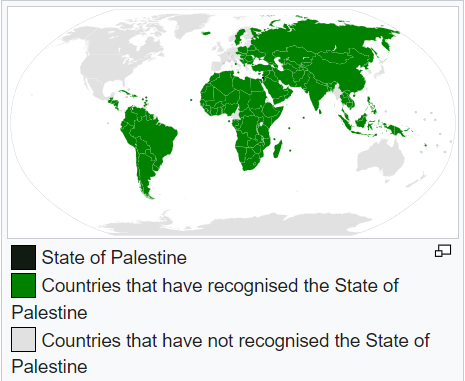
October 10 – Updates
China has called for an immediate ceasefire and a two-state solution to the Israel-Palestinian crisis. The Chinese statement can be seen here. Beijing has been criticized by the West for not condemning the Hamas attacks. In fact, the Ministry of Foreign Affairs did not mention the group but instead called for Israel to recognise Palestine as the only viable solution.
The Russian Foreign Minister Sergey Lavrov has met with Arab League Secretary General Ahmed Aboul Gheit in Moscow to discuss the hostilities. He later stated that Russia also wanted an immediate ceasefire and that the existing status quo between Israel and Palestine had failed. That too implies that Russia is looking for a two-state solution. Gheit also stressed that the fighting would continue until Palestine was granted full recognition by Israel.
The United States and European Union have both taken the side of Israel, condemned Hamas (the current, elected Palestinian government) and pledged financial and military support for Tel Aviv. This could raise the possibility for further clashes between the West and Russia as well as with the Arab States. Several EU nations have suspended aid to Palestine, which is also blockaded by Egypt and Israel.
This means supplies must enter either smuggled in via Lebanon or via the Mediterranean coast, which is monitored by the Israeli Navy. An estimated 5 million people live in Palestine including just over 2 million in the Gaza Strip. Israel has ordered a ‘siege’ on Gaza with no access to food, electricity, or water while now subjecting it to heavy bombardment. The humanitarian difficulty is that there is nowhere for ordinary Palestinians to escape the conflict except by sea – which is heavily mined and patrolled by the Israeli navy.
Statements also made by both Israel and the United States have suggested that there is no evidence that Iran was involved in the attacks.
As at close of business Monday (October 9) an estimated 600 Palestinians have been killed since the outbreak, while over 3,000 have suffered significant injuries. In Israel, more than 800 people have died and over 2,500 have sustained hospitalisation wounds.
An emergency session of the Foreign Ministers of the Council of the League of Arab States (LAS) over the escalation in the Gaza Strip will be held in Cairo on Wednesday (October 11). The LAS includes Algeria, Bahrain, Comoros, Djibouti, Egypt, Iraq, Jordan, Kuwait, Lebanon, Libya, Mauritania, Morocco, Oman, Palestine, Qatar, Saudi Arabia, Somalia, Sudan, Syria, Tunisia, the United Arab Emirates, and Yemen.
The existing fault-lines lie between the United States, EU and Israel on one hand who do not wish to endorse the creation of a legitimate Palestinian State, against the opinions of China, Russia and almost certainly the entire Arabic community who do.
The unprecedented and expanding violence that has engulfed Israel is creating significant problems in the Middle East, with the conflict having the potential to spill over into a far wider area. With China and Russia also heavily involved as actors with all players, the impact on trade and regional geopolitics has created a new layer of insecurity for a region that was poised to remain calm. Those illusions have now been shattered. Beijing and Moscow will want a lid put on this as soon as possible however other actors also have vested interests and long-held grievances to suggest that this may prove difficult.
The initial strikes on Israel were carried out by Hamas, the fundamentalist and military organization who currently hold a majority within the Palestine government. Their main political rival in Palestine is Fatah, who Hamas defeated in elections held within the Palestinian Gaza Strip enclave in 2006. Methods used to put forward the case for an independent Palestine state have often been violent, although a cease-fire agreement reached with Israel in 2021 has raised their popularity.
Hezbollah are a Lebanese group who have also attacked Israel in support of Hamas and Palestine. Israel is now essentially fighting on two fronts – against Hamas and specifically the Gaza Strip, and now against Lebanon. The outbreak has been sudden and vicious with any outcome highly uncertain. The danger of escalation is very real.
The main issue focusses on the recognition of a Palestinian state, which Israel continues to block. This has led to increasing resentment, and sporadic violence between the two. Both countries have hard-line leaders and politicians in place.
The situation is volatile and creates significant problems for both China and Russia’s presence in the region. The United States and European Union are highly supportive of Israel and have labeled Hamas and Hezbollah as terrorist organisations. Both are financially supported by Iran.
Both Hamas and Hezbollah also maintain a diplomatic aspect while both also deny the right of Israel to exist. Countries friendly towards them include Iran and Turkiye, although their record of engagement has been patchy – relations with Syria deteriorated, while relations with Qatar have improved. Both have also covertly been engaged in the Syrian conflict as well as supportive of rebels within Yemen.
While the conflict revolves around the international status of Palestine at its heart, diplomatic, political and religious differences continue to prove highly problematic. Not all in Palestine agree with the Hamas approach, which has essentially radicalized the Gaza Strip and used this support to sweep to political and military power in Palestine overall. Yet both China and Russia maintain at least full diplomatic relations with Palestine, meaning in turn full relations with Hamas.
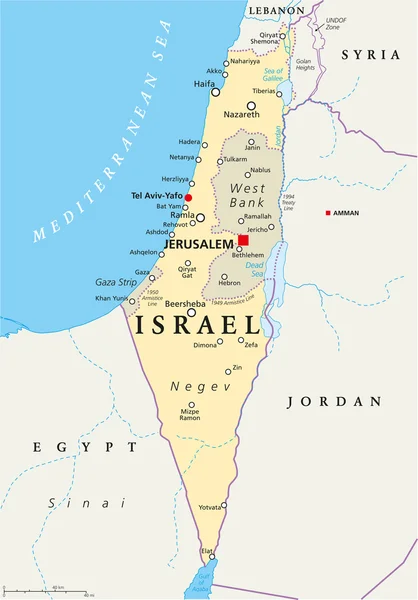
Israel has been quick to condemn China, saying that it expected a stronger response from Beijing over the weekend’s attacks and that these showed that the peace process put forward by Beijing was ‘’unworkable”. Similar messages have been sent to Moscow. Both will want to see an immediate ceasefire.
Both Beijing and Moscow have been pursuing a line of regional détente, China recently brokering a peace deal and the resumption of diplomatic relations between Iran and Saudi Arabia. That has waved significant red flags in Washington, not best pleased to have been replaced as the regional deal maker. With the United States shooting down a Turkish drone over Syria last week, with the Russian military also engaged in preserving some semblance of regional recovery, China is waiting in the wings to lend reconstruction assistance. Both Beijing and Moscow want to see Syria repositioned as a trade corridor between East and West. The situation in Israel could lead to further violence in Syria as the country yet again teeters on the fault lines between Europe and Asia, and Christian and Muslim.
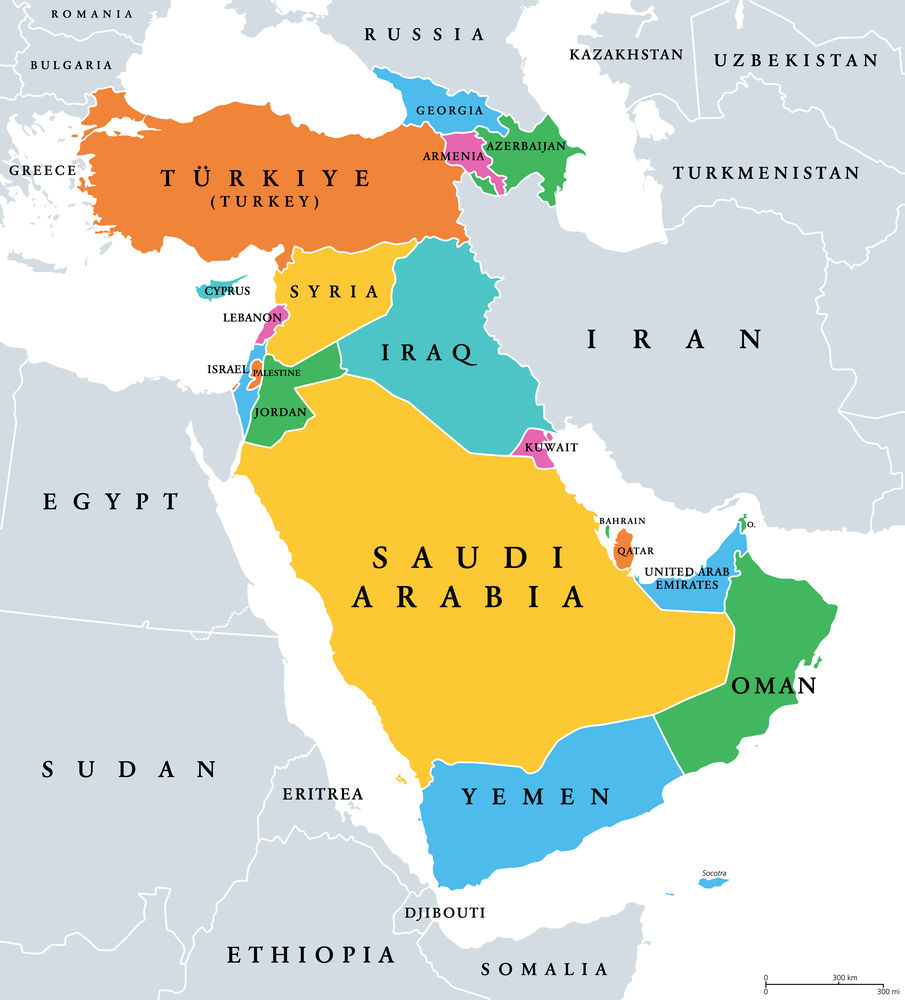
The Israeli conflict – while currently localized if extremely violent – has the potential to be a battleground between the United States, Russia and China as concerns regional development in the Middle East. Saudi Arabia, courted most recently by both China, and Russia as part of the Belt & Road Initiative and the Shanghai Cooperation Organisation, has also bene a focus of US President Joe Biden who has been pushing for a Saudi Arabia-Israeli establishment of diplomatic relations. That puts immediate stress on the recently agreed Saudi-Iran rapprochement brokered by Beijing. Also quietly not noticed by the West – or at least on the surface, somewhat dismissed – has been China and Russia’s embrace of the MENA region via the planned inclusion of five new MENA-influential nations into BRICS. With one of those – Egypt – also having difficult relations with Israel yet having additionally placed the Gaza Strip under a blockade for the last few years, the conflict is as tangled and unpredictable as can be imaged. Riyadh will want to step in – and with US support, could recognise Israel. Doing so would create significant problems with Iran – supported by both China and Russia. That could stymie the entire International North-South Transportation Corridor (INSTC) routes that direct trade north-south between Russia and the Middle-East and South Asia, as well as the Middle Corridor routes that connect Islamic Central Asia with the Islamic Middle East.
With the United States and European Union having just talked up their proposed alternative, running from India, across Saudi Arabia, via Jordan and into Israel for shipping to Europe, the Hamas and Hezbollah issues with Israel carry significant trade development and geopolitical weight. How this conflict ends will likely determine whether the Middle East turns towards China and Russia for its future security and trade, or whether it returns to an American pivot. The danger is that further escalation cold result in a regional conflict far more difficult to resolve and significantly more dangerous. Given the entrenched positions of both sides concerning Ukraine, the prognosis cannot be immediately positive. But then again, the development of a second peace-keeping front for Israel and the Middle East may also usher in an end for Western support in Kiev. After all, what better way to exit one conflict without too many questions being asked by developing another, even more potentially dangerous scenario? The question is who manages and brokers these agreements.
Update October 9
To illustrate who is taking immediate responsibility for de-escalating the Israel conflict with Hamas, the Secretary General of the League of Arab States (LAS) Ahmed Aboul Gheit, has flown to Moscow to discuss the situation with the Russian Foreign Minister Sergey Lavrov. Talks will be held today (Monday October 9) with specific attention on the situation in the Gaza Strip.
China meanwhile has called for ‘calm and restraint’ as Israel declares war after the Hamas raids, with Beijing stating that “China is ‘deeply concerned about the current escalation of tension and violence between Palestine and Israel” along with calls for a ceasefire.
The United States has taken an immediate pro-Israel side and vowed military support for Tel Aviv after the deadly Hamas attacks. These initial moves appear to pit the United States against the Arab world despite recent US calls for Israel-Saudi reconciliation. The US Secretary of State, Antony Blinken, has however made phone calls to the Presidents of Egypt, Saudi Arabia and Turkiye. He was due to visit Saudi Arabia next week with that trip now being seen as a bellweather for American regional intent.
A closed-door session of the United Nations Security Council was held last night (October 8), with Brazil holding the current Chair. It was attended by permanent members (China, France, Russia, the United Kingdom, and the United States) and non-permanent members (Albania, Brazil, Ecuador, Gabon, Ghana, Japan, Malta, Mozambique, Switzerland, and the United Arab Emirates. No information has as yet been released about this meeting.
China will hold the Chairmanship of the UN security council during November. Russia will hold it in July next year with the United States not due to hold the position until December 2024.
The current status means that the conflict is being dealt with at a Foreign Ministerial rather than Presidential basis. Israel however will want it to become a pillar of next year’s US Presidential elections and Washington support at a time the latter is already supporting a Jewish President in Ukraine. Who shouts loudest for attention between Netanyahu and Zelensky will be a key focus of US regional interests.
Zelensky has called Netanyahu and ‘expressed solidarity’ over the Hamas attacks on Israel – an issue that will reduce Ukrainian support in the Middle East, whose member states until now have been largely ambivalent.
Chris Devonshire-Ellis is the Chairman of Dezan Shira & Associates. He can be reached via asia@dezshira.com
Related Reading
- Can China & Russia Reposition Syria With The ‘Five Seas’ Strategy?
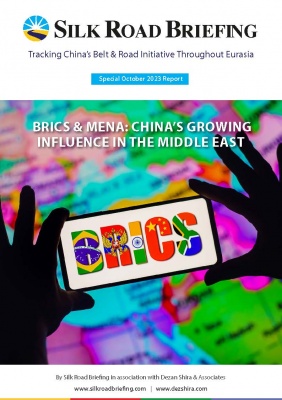 BRICS & MENA: China’s Growing Influence in the Middle East
BRICS & MENA: China’s Growing Influence in the Middle East
About Us
Middle East Briefing is one of five regional publications under the Asia Briefing brand. It is supported by Dezan Shira & Associates, a pan-Asia, multi-disciplinary professional services firm that assists foreign investors throughout Asia, including through offices in Dubai (UAE), China, India, Vietnam, Singapore, Indonesia, Italy, Germany, and USA. We also have partner firms in Malaysia, Bangladesh, the Philippines, Thailand, and Australia.
For support with establishing a business in the Middle East, or for assistance in analyzing and entering markets elsewhere in Asia, please contact us at dubai@dezshira.com or visit us at www.dezshira.com. To subscribe for content products from the Middle East Briefing, please click here.
- Previous Article BRICS & MENA: China’s Growing Influence In The Middle East: New Report
- Next Article Iraq – China Trade and Developments


